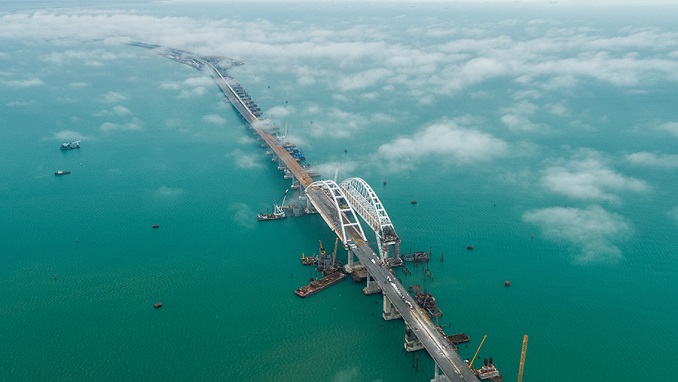The European Union has condemned the opening of a railway bridge to the Russian-annexed Crimea peninsula by President Vladimir Putin as “another violation” by Russia of Ukraine’s sovereignty and territory, RFE/RL reported.
EU spokesman Peter Stano said not only was the Kerch bridge “a continuation of [Russia’s] forced integration of illegally annexed Crimea”, it also limited free passage for ships heading to Ukrainian ports in the Azov Sea.
The EU has already banned imports of non-Ukrainian goods from Crimea or Sevastopol and banned European companies from investing there. European cruise ships are not allowed to dock in Crimea unless in an emergency.
Russia’s 19km (12-mile) bridge to Crimea first opened in May last year. Putin heralded the opening of the bridge’s railway’s section on Monday by posing in the driver’s cab and praising construction workers. He asserted that millions of cars had already crossed the bridge and said the rail link “was a big deal as well”, with plans to carry 14 million passengers and 13 million tons of freight in 2020.
The first train left St Petersburg on Monday afternoon carrying more than 500 people on the 2,500km trip to Crimea’s Sevastopol.
Until the bridge was built, Russia had to rely on sea and air to supply the peninsula, which it seized from Ukraine in February 2014 before annexing it through a referendum rejected by the United Nations as invalid.
The $3.6 billion bridge was built by a company owned by billionaire oligarch Arkady Rotenberg, a close friend of the president. Rotenberg and several of his companies had EU and U.S. sanctions imposed on them.
Putin said the Kerch Strait bridge, with its new rail link, would have an impact on Russia’s economy as a whole. In a tweet, the presidency declared the bridge open to railway traffic.
The president boarded a three-carriage train in the Crimean city of Kerch, stood in the cab beside the driver and sounded the horn, before sitting with Rotenberg as well as Russian and local officials as they traveled across the strait to Taman in southern Russia.












